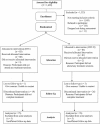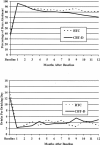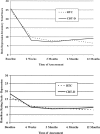A randomized controlled trial of cognitive-behavioral treatment for depression versus relaxation training for alcohol-dependent individuals with elevated depressive symptoms
- PMID: 21388602
- PMCID: PMC3052898
- DOI: 10.15288/jsad.2011.72.286
A randomized controlled trial of cognitive-behavioral treatment for depression versus relaxation training for alcohol-dependent individuals with elevated depressive symptoms
Abstract
Objective: A previous pilot study found positive outcomes among alcohol-dependent individuals with elevated depressive symptoms who received cognitive-behavioral treatment for depression (CBT-D; n = 19) compared with a relaxation training control (RTC; n = 16). The current study represents a replication of this pilot study using a larger sample size and a longer follow-up assessment period.
Method: Patients entering a partial hospital drug and alcohol treatment program who met criteria for alcohol dependence and elevated depressive symptoms (Beck Depression Inventory score ≥ 15) were recruited and randomly assigned to receive eight individual sessions of CBT-D (n = 81) or RTC (n = 84).
Results: There were significant improvements in depressive and alcohol use outcomes over time for all participants.Compared with RTC, the CBT-D condition had significantly lower levels of depressive symptoms, as measured by the Beck Depression Inventory, at the 6-week follow-up. However, this effect was inconsistent because there were no differences in the Modified Hamilton Rating Scale for Depression between conditions at that time point and there were no significant differences at any other follow-up. No significant between-group differences on alcohol use outcomes were found.
Conclusions: The current findings did not replicate the positive outcomes observed in the CBT-D condition in our previous pilot study. Possible explanations for why these findings were not replicated are discussed, as are theoretical and clinical implications of using CBT-D in alcohol treatment.
Figures



References
-
- American Psychiatric Association. Diagnostic and statistical manual of mental disorders. 3rd ed., rev. Washington, DC: Author; 1987.
-
- American Psychiatric Association. Diagnostic and statistical manual of mental disorders. 4th ed. Washington, DC: Author; 1994.
-
- Beck AT, Ward CH, Mendelson M, Mock J, Erbaugh J. An inventory for measuring depression. Archives of General Psychiatry. 1961;4:561–571. - PubMed
-
- Benson H. The relaxation response. New York: William Morrow; 1975.
-
- Booth BM, Yates WR, Petty F, Brown K. Patient factors predicting early alcohol-related readmissions for alcoholics: Role of alcoholism severity and psychiatric co-morbidity. Journal of Studies on Alcohol. 1991;52:37–43. - PubMed
Publication types
MeSH terms
Substances
Grants and funding
LinkOut - more resources
Full Text Sources
Medical
Miscellaneous

